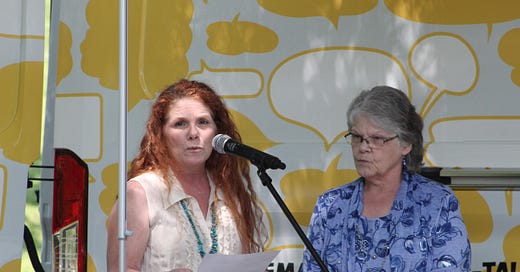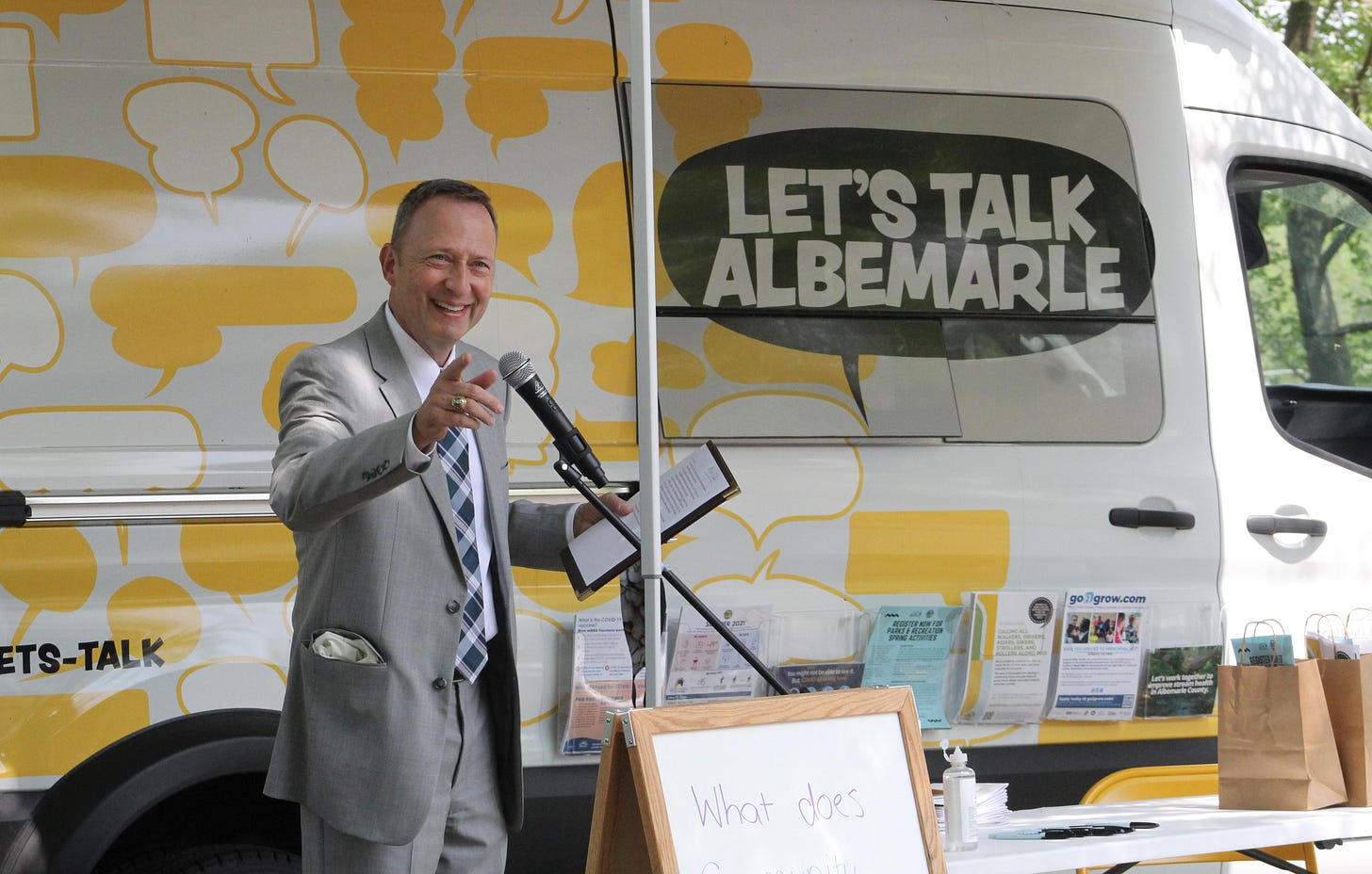In today’s Patreon-fueled shout-out...your local energy nonprofit, LEAP, offers FREE home weatherization to income- and age-qualifying residents. If you’re age 60 or older, or have an annual household income of less than $75,100, you may qualify for a free energy assessment and home energy improvements such as insulation and air sealing. Sign up today to lower your energy bills, increase comfort, and reduce energy waste at home!
In this installment:
Charlottesville’s public housing board gets an update on safety, demand for housing choice vouchers, and a status report on Crescent Halls renovation
Albemarle cuts the ribbon on its new community engagement van… no relation to this newsletter!
An informal partnership came together this month to rebuild a boat launch in Riverview Park
A very brief question about the Alberene Soapstone quarry
The pandemic is not over, but there are many signs that public life is returning. On Wednesday, members of the Albemarle County Board of Supervisors and senior staff gathered at Darden Towe Park to cut the ribbon on a new van that will be used to support community engagement efforts. Jeff Richardson is the county executive.
“It is really good to be with everyone today and I think it’s very fitting that today we are at Darden Towe Park, which I would like everyone to know was our busiest park over the last 14 months as we’ve worked through this crisis,” Richardson said.
In all, the parks system had a million visitors in the last year as people sought open space. This event was the first in-person celebration of a county service since January 31, 2020.
“And on January 31, 2020, we had skate night at Yancey School Community Center, which was the kickoff for the community programming at that new community center,” Richardson said.
Supervisor Ned Gallaway said the idea for the van came about last summer as community engagement staff visited parts of Albemarle.
“They were popping up in the county at country stores, neighborhoods, parks with regularity to distribute cloth face coverings as needed,” Gallaway said. “And a lot of time went into packing and moving and unpacking materials and stuff spent the events out in the elements for several hours. This van provides a central location to store things and move materials.”
The money for the van came from the county’s share of federal pandemic relief funds.
But, the event was not just to show off the new community engagement van. The event was held to showcase the series of little libraries by stocking them with a pamphlet on Monacan history written by the late Karenne Wood and Diane Shields.
Shields’ and her daughter Teresa Pollak spoke at the event. Let’s hear a long segment.
“The land we are on is but a small portion of land inhabited by people who called themselves Yesan, which means ‘the people,’” said Teresa Pollak. “[The people] inhabited the land in the interior portion of what today we call Virginia from the New River to the fall line at Richmond for hundreds of generations before the arrival of Europeans. Through years of warfare, disease, forced migration, and broken treaties, the original people were reduced to a fraction of their original members, living on a small portion of their original land. They were forced into assimilation by the dominant culture.
“The descendants of the original inhabitants are still here today. I am one of those descendants. We are known as Monacan and we understand that the land is the people, and the people is the land and we are not strangers on any of that land that was once considered our territory. As we are able to have air to breathe, water to drink, remember that the original people, my ancestors have been stewards of the land for centuries and they have made it possible for us to enjoy many of our natural resources that we still have.”
Diane Shields spoke as well.
“For so many generations, the Monacan people were overlooked, or misdiagnosed, or miscalculated, or mis a lot of things,” Shields said. “Our people have been classified as different races than what they were. A lot of that has been corrected. I’m sure all of you are familiar with the Racial Integrity Law. That was a very difficult time for our people as well as all the other Indian communities because of the way we were classified. But those times are pretty much behind us. Now we work with the state to be able to correct birth certificates.”
To learn more, go visit a county park and pick up the pamphlet.
The Rivanna River meanders down from Darden-Towe Park to Riverview Park which is on the western shore in the city of Charlottesville. Just in time for the Rivanna River Fest, work has wrapped up on an initiative to replace a boat launch and stairway at the park which washed away this past winter. According to a city press release, Woolen Mills resident Bill Emory approached the city this March with a plan to put in a new stairway using donated materials and labor. The Rivanna River Company, the Rivanna Conservation Alliance, and the Piedmont Environmental Council helped coordinate construction, which took place over a three-day period earlier this month.
“The result is a new and improved river access point stairway engineered to withstand exposure to strong currents and future flooding events,” reads the press release.
We’re living in these days, but others have lived here before, spending days in built environments that are no longer with us and places of work that have long been out of business. In southern Albemarle and northern Nelson County, the Alberene Soapstone Company for many years operated out a quarry in Schuyler, fueling the economic fortunes of the village of Esmont. Peggy Denby of the group Friends of Esmont is hoping to encourage the Albemarle Historic Preservation Committee and the county to take note of the remnants of the former quarry.
“They’re beautiful,” Denby said. “I just wanted somebody to know other than me that these things do exist. And I think a story could be written to talk about every one of the pieces of building that are discovered and the process that happened when the quarry was operational.”
This includes a canal, a system of trains, and so many other functions that are now gone. The land is in private ownership now. Denby wants the county to consider buying the land.
Supervisor Ann Mallek said she purchased material directly from the quarry back in the 1980’s.
“It is an incredible place but it will take a special owner to facilitate telling the story,” Mallek said.
Mallek pointed out that most of the parkland the county receives comes about my donation. That’s been the case for the Byrom Reserve, Preddy Creek and the new Brook Hill river park.
*
You’re reading Charlottesville Community Engagement. This show has now been produced for nine and a half months, for people to listen to or read for free. I’m grateful for those who have been able to spend a little money to keep me self-employed, doing this work seven days a week. If you can spare the funds and want to support this show, right now if you pay for a subscription through Substack, Ting will match the amount! So if you’re paying $5 a month, $50 a year, or the very generous $200 a year founder’s subscription, Ting will match the amount in the name of supporting local journalism. This is how I want to spend my time, and every dollar spent goes to build up what is becoming a community resource. Click here to learn more about why Ting is making this effort! Pass it on!
*
For the rest of the show, we drop in on the April 26, 2021 meeting of the Board of Commissioners of the Charlottesville Redevelopment and Housing Authority.
This is the first week of the year with temperatures coming close to summer-like levels. That’s raising the concern of some Charlottesville residents who are concerned that hotter nights may lead to violence.
Laura Goldblatt is one of seven commissioners on the Charlottesville Redevelopment and Housing Authority, and at Monday’s CRHA Board meeting, she reported from the Safety Committee, which has been reviewing what comes next when a contract with a security firm expires this May.
“If there’s going to be security or any groups in public housing communities, the ways that they want them to behave, the ways that they want to behave, what they expect from them, and what they think safety means to them,” Goldblatt said. “The other thing that I’ve heard very clearly from residents in those meetings is a real sense of urgency. People are really concerned about the change in the seasons and the summer coming on and they feel they need a concrete and firm plan and they need to understand what’s going on and they need that to be communicated.”
Work has now begun on both renovation of Crescent Halls and construction of new units at the South First Street site. CRHA Chair Betsy Roettger said the time is coming when the CRHA’s development subcommittee will soon turn its attention to what will come next for redevelopment.
“We really need to get moving on what we’re going to do next, the next moves and get it in front of residents quickly to get feedback,” Roettger said.
Roettger said many of the new CRHA commissioners are relatively new to the group and it would be good for them to get a sense of how the CRHA got to this point.
“It needs to be soon because we’re going to be moving quickly with whatever site is next due to the tax credit application cycle,” Roettger said.
The next deadline to apply for low-income housing tax credits from Virginia Housing is next March. There will be an update on redevelopment at a committee meeting next Thursday that members said they would attend, but the idea of an in-person retreat was floated.
One Commission said she would prefer to continue meeting virtually for the foreseeable future. Virtual meetings are allowed under the state of emergency, but won’t be once Governor Ralph Northam lifts the order. David Oberg is the legal counsel for the CRHA.
“State law does not allow at this point, but it’s very possible it’s going to be changed but at this moment, if the governor removes his emergency order, all local entities will be required to meet in person,” Oberg said.
Roettger said she felt the in-person meetings had a dynamic to them created by the physical space in City Council Chambers.
“To have us all sitting up high and residents that come sitting in the seats looking up,” Roettger said.
There were other updates at the April 26 meeting as well. The wait list for federal housing vouchers opened for a week long period in late March. John Sales is the CRHA executive director.
“We now have a total of 1,311 individuals on the waiting list for the [Housing Choice Voucher] program,” Sales said. “We’ve sent out 50 eligibility letters. About a fifth of those are living in public housing now.”
Work at Crescent Halls is now underway, according to CRHA Deputy Director Kathleen Glenn-Matthews.
“There’s a construction fence up, gravel driveway in the back, they’re getting prepped on the 8th floor,” Glenn-Matthews said. “Work on the first floor is starting May 17 and the substantial completion date right now is set for November 25, 2022.”
Residents involved in planning for the second phase of the South First Street redevelopment have begun to meet once more. There was a meeting last night, in fact. The CRHA was awarded low-income housing tax credits for that project in the 2020 cycle.
*
Mixing up the end here to let you know about an upcoming podcast coming up that celebrates a place none of us have been able to go to for a year - Italy!
Tour guide Tullia Maffei hasn’t been able to lead any of her usual adventures, but during the pandemic she teamed up with award winning journalist and producer, Allison Salerno to bring a little bit of that country’s people to your kitchen table or wherever you listen to your podcasts. You’ll now hear a quick promo of Italy - from the Heart!


















Share this post